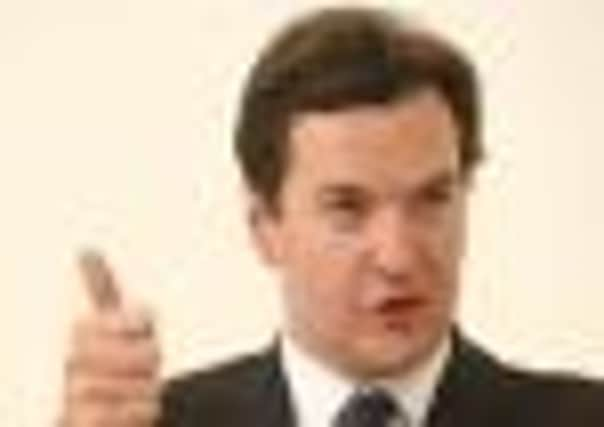George Osborne’s debt target 22% off course


Public-sector net borrowing in the financial year to date was £59 billion at the end of August, the Office of National Statistics said yesterday.
The Chancellor wants to limit borrowing for the full year 2012-13 to £120bn. But the chances of hitting this target are looking increasingly slim, according to most economists, as the recession impacts on tax receipts and government spending.
Advertisement
Hide AdAdvertisement
Hide AdOn Thursday, the Governor of the Bank of England, Sir Mervyn King, appeared to suggest the government will abandon the target and blame a lack of growth in the world economy when Mr Osborne gives his autumn statement on 5 December.
Sir Mervyn said: “If it’s because the world economy has grown slowly, so we have in turn grown slowly, then that would be acceptable. It would not be acceptable if we have no real excuse.”
The failure to hit the target has been blamed on a lack of growth in the UK economy, with the country mired in a double-dip recession.
Last night, the government tried to put a brave face on the figures, which showed borrowing for August at £14.4bn.
Exchequer Secretary to the Treasury David Gauke said: “These figures show the government borrowed almost £7bn less last year than previously estimated by the independent Office for National Statistics, down nearly £40bn from the peak of two years ago. This is further evidence that we are dealing with our debts and getting the deficit down.”
A Treasury spokesman added: “Borrowing figures for August this year are better than the markets expected and, for the first month this financial year, in line with those of last year.
“This underlines why, at such an uncertain time, we should not second-guess what the Office for Budget Responsibility will forecast later in the year.”
But opposition parties insisted it was further evidence that a stimulus package is needed to boost the UK economy.
Advertisement
Hide AdAdvertisement
Hide AdEarlier this week, at a summit devolved government leaders in Downing Street, First Minister Alex Salmond led calls for £5bn to be released across the UK for “shovel-ready projects”.
Yesterday, Labour’s Treasury spokesman, Chris Leslie, said: “These figures show the deficit is rising because the government’s economic plan is failing.
“By choking off the recovery with tax rises and spending cuts which go too far and too fast, George Osborne’s pledge to balance the books by 2015 is already in tatters and there are now serious questions about whether he can meet his debt target.
“But without urgent action to kick-start our economy, the Chancellor will end up borrowing billions more to pay for economic failure and cause yet more long-term damage to our economy.”
The figures also led to calls from business leaders for action.
David Kern, chief economist at the British Chambers of Commerce (BCC), said: “Unless present trends are reversed in the next few months, we now expect total borrowing in 2012-13 as a whole to exceed the total predicted by the OBR at the time of the Budget by more than £20bn.
“To maintain credibility, the government should persevere with a realistic plan to reduce the deficit, but if persistently weak growth causes borrowing to overshoot, the UK’s credit rating may be endangered.”